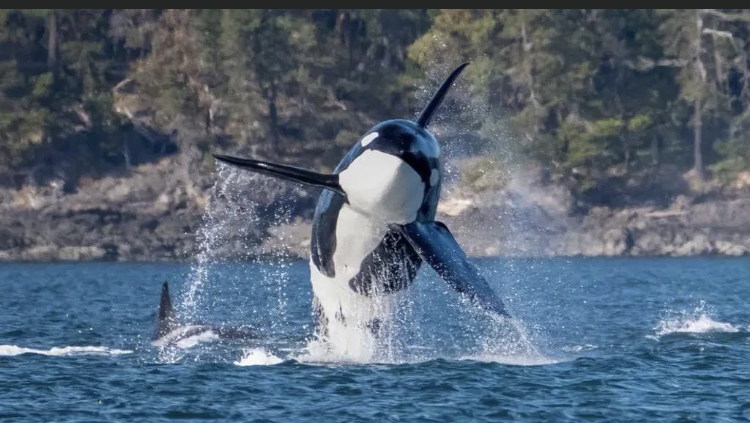The mighty Orca or more specifically the Sothern Resident Killer Whale (SRKW) is a creature we revere as much as the Salmon we harvest. The National Oceanic and Atmospheric Association (NOAA) is the custodian of the SRKW as well as the managing authority of our fishery. They issue our fishery what is called a “Take” permit in order for us to conduct our fishery. No permit, no fishing. NOAA has published several articles on West Coast Salmon Fishing and Southern Residents: Part 1 | NOAA Fisheries and West Coast Salmon Fishing and Southern Residents: Part 2 | NOAA Fisheries that are very enlightening and recommend you read. It removes the rhetoric and emotion and looks at the SRKW and Chinook harvest from a scientific point of view. Meanwhile, we have taken numerous steps and made considerable concessions to see this Pacific Northwest icon rebuild to a healthy level. Below are just a few we have taken as well as recent scientific findings that conclude lack of prey or overfishing is not the issue.
1.) A pair of marine mammal scientists at The University of British Columbia, Dr. Burak Saygili and Dr. Andrew Trites, have published a peer reviewed paper that claims by others who say; “The decline in Southern Resident Killer Whale populations in the Pacific is caused by not having enough access to salmon.” are wrong! In the published paper the study stated, “what we found was the opposite of what we expected, what was predicted,” said Dr. Andrew Trites, “the prevalence of chinook was double in the Southern Resident Killer Whale habitat.” I think it undermines the premises for a lot of that (previous) research, and I think it undermines how quickly some people have jumped to conclusions. They’ve connected dots that should not be connected, and they’ve had huge leaps of faith in doing that.” This new peer reviewed paper is the first in depth research into the habitat of the SRKW by an independent, reputable source that has the highest level of education and training to do so. Here is a link to their published peer reviewed paper. Prevalence of Chinook salmon is higher for southern than for northern resident killer whales in summer hot-spot feeding areas | PLOS ONE
2.) NOAA has stated on record as saying, “even if all harvest was halted, we would only be saving between 1%-4% for the Orcas diet”. Below is a chart provided by NOAA for the Washington coast that shows Chinook abundance in orange and total ocean harvest in blue during the timeframe in which we fish. Our annual harvest, which occurs during peak Chinook abundance, is typically under 2.5% of Chinook abundance in any given year.
Abundance of Chinook salmon ages three to five north of Cape Falcon, Oregon, which encompasses the Washington Coast. Orange indicates the total abundance of adult Chinook salmon and blue indicates the amount removed by ocean salmon fisheries off the West Coast.
3.) The specific Chinook Salmon we harvest in the Pacific Ocean has been rated by The Monterey Bay Aquarium Seafood Watch Program as sustainable. This complex and thorough rating considers impacts on the environment that include the SRKW as well as other species we encounter. (look for “Trolling Lines”-North of Cape Falcon) Our Chinook Rating
4.) Our fishery has sacrificed highly productive fishing areas and entirely closed them to fishing (large mushroom area known as Swiftsure Bank and beyond at the western edge of the Strait of Juan de Fuca) that the SRKW at times inhabits and feeds.
5.) We have adjusted and severely restricted our overall quota on the north coast of Washington State (the area where the SRKW sometimes inhabits) so that only a small percentage of our quota can be harvested there.
6.) Our seasonal quotas are strictly managed and limited by the lowest returning stock we encounter where crucial impacts are considered, including impacts on the SRKW food source. Once it is determined that a stocks impact is reached, our fishery’s quota is at its max. We are not an abundance-based fishery!
7.) We have had seasons where zero fishing has been allowed to aid in Salmon recovery.
8.) We are a limited entry fishery with a moratorium on new licenses that has been in place for over 30 years and have reduced our fleet to just 150 licenses. However, on average approximately only 50 licenses fish each season.
9.) We have voluntarily increased our license fees and taxes to assist the Washington State Department of Fish and Wildlife to assist in Salmon recovery.
10.) We are members of Save our Wild Salmon @saveourwildsalmon, and the Monterey Bay Aquarium Seafood Watch Program @montereybayaquarium
11.) We are hook and line Troll fisherman, (trolling lines through water) considered to be the most sustainable method of capturing wild Salmon because we catch one fish at a time and are able modify our lures, technique, and area for specific species to reduce by-catch.
The fundamental point to consider is we should entrust the organization (NOAA) responsible for safeguarding the Southern Resident Killer Whales (SRKW) and our Chinook salmon with the task of regulating the harvest. It is essential to prioritize their well-being and ecosystem balance in any decisions regarding resource management. Raising awareness for the plight of the Southern Resident Killer Whales (SRKW) is indeed commendable and necessary. While opting out of consuming Washington Chinook entirely may seem like a solution, it could inadvertently reduce its worth and market demand, potentially exacerbating the challenges faced by these majestic creatures.


